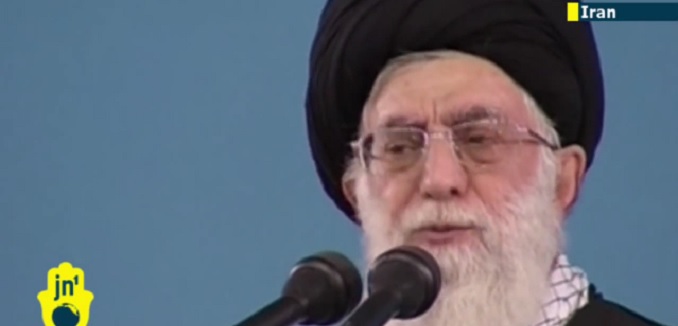Tensions deepened on Thursday between the White House and Congress over the Obama administration’s diplomacy toward Iran, after the Wall Street Journal reported that that President Barack Obama had sent a secret letter to Supreme Leader Ayatollah Ali Khamenei discussing a proposed nuclear deal and suggesting that Washington and Tehran could cooperate in battling Sunni extremists in the Middle East. The outlet contextualized the letter against the backdrop of recent elections:
Mr. Obama’s push for a deal faces renewed resistance after Tuesday’s elections gave Republicans control of the Senate and added power to thwart an agreement and to impose new sanctions on Iran. Sens. Mark Kirk (R., Ill.) and Robert Menendez (D., N.J.) have introduced legislation to intensify sanctions.
“The best way to prevent Iran from getting a nuclear weapon is to quickly pass the bipartisan Menendez-Kirk legislation—not to give the Iranians more time to build a bomb,” Mr. Kirk said Wednesday.
The Daily Beast had a day earlier assessed that Republican control of the Senate, which would among other things see Sen. John McCain (R-Ariz) assume control of the powerful Senate Armed Services Committee, had created “an interesting moment in Washington, where even the dovish side of the Republican Party now acknowledges the midterms were a win for their party’s American exceptionalists.” The outlet quoted Rep. Devin Nunes (R-CA), who is likely to take over on the House side as chairman of the chamber’s Intelligence Committee, predicting that there would soon “be real scrutiny from the House and Senate in what’s taken place on the entire Obama administration’s tenure dealing with the Iranians.” But anger toward the administration’s approach to Iran had already been running high on the Hill before the election.
The Journal’s scoop came almost exactly a week after a separate article in which the outlet documented wide-ranging, bipartisan “concern and criticism over warming ties between the Obama administration and Iran.”
The Washington Free Beacon subsequently published audio, taped last January, of deputy national security adviser Ben Rhodes telling progressive groups that the White House was structuring its agreement with Iran in a way designed to circumvent congressional oversight:
“Bottom line is, this is the best opportunity we’ve had to resolve the Iranian issue diplomatically, certainly since President Obama came to office, and probably since the beginning of the Iraq war,” Rhodes said. “So no small opportunity, it’s a big deal. This is probably the biggest thing President Obama will do in his second term on foreign policy. This is healthcare for us, just to put it in context.”
The revelation of President Obama’s letter to Khamenei deepened Congressional suspicion and anger, and generated terse reactions from lawmakers. Asked about it by reporters, Speaker of the House John Boehner responded “I don’t trust the Iranians. I don’t think we need to bring them into this, and I would hope that the negotiations that are under way are serious negotiations, but I have my doubts.”
Veteran Associated Press reporter Matt Lee repeatedly pressed State Department Spokesperson Jen Psaki on the potential fallout from the revelation at Thursday’s press briefing, declaring that literally no members of Congress – “none of them, even Democrats, even lawmakers from the President’s own party, are supportive of the way” the deal is reportedly shaping up.
Psaki refused to answer questions about the letter’s existence or implications, instead telling reporters that they would have to address their questions to the White House.
White House Spokesperson Josh Earnest in turn declared that he would not answer questions about the reported letter because he was “not in a position to discuss private correspondence between the president and any world leader.”
[Photo: JewishNewsOne / YouTube]




